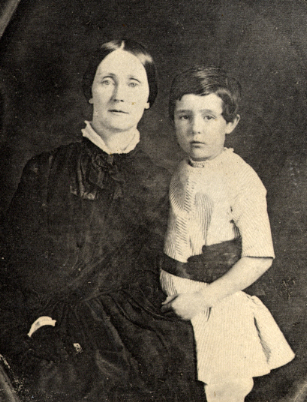 |
ELIZABETH HOAR
30. Photograph of Elizabeth Hoar and child, from Emerson
family photograph album. Album from the estate of Amelia Forbes Emerson,
1982.
Emerson regarded Elizabeth Hoar (1814-1878) as a member of his family as well as of the thoughtful circle of individuals drawn to his home for discussion and friendship. She was the daughter of lawyer Samuel Hoar and sister of Ebenezer Rockwood Hoar (lawyer, judge, Massachusetts senator, Attorney General of the United States in the cabinet of President Ulysses S. Grant, representative in the United States Congress, and Emerson’s friend), of George Frisbie Hoar (lawyer and representative and senator in Congress), and Edward Sherman Hoar (Thoreau’s friend and traveling companion). Educated at the old Concord Academy, she was learned—a proficient Greek scholar—and a woman of powerful intellect, deep religious sensibility, and reform sympathies. Elizabeth Hoar was close to many with whom Emerson associated. An intimate of the Thoreaus, Channings, and Hawthornes, she was a friend of Elizabeth Peabody and Margaret Fuller (whose Boston conversation series she attended), of Fuller’s brother Richard, Caroline Sturgis (later Tappan), and Anna Barker (Ward). While abroad, she met Thomas Carlyle and other literary people whom Emerson knew from his European trips. In 1833, Charles Chauncy Emerson—Waldo’s younger brother, a lawyer—and Elizabeth Hoar became engaged. Charles managed Sam Hoar’s Concord law office while the Squire served in Washington as a representative in Congress, beginning in 1835. The couple made plans to marry in September, 1836. The Emersons renovated their home in anticipation of the newlyweds living with them. Emerson and Elizabeth Hoar were both dealt a severe personal blow in May, 1836, when Charles died of tuberculosis. Elizabeth continued to live in her parents’ Main Street home. Emerson expressed the profound respect he felt for Elizabeth Hoar many times—for example, in a letter he wrote her on November 23, 1839: “Where is my letter to which I give you fair challenge? You are a sovereign woman & shall do as you choose, but in some hour of benevolence you may remember those who are bound in the bonds of analyzing the Age. I do not wish to know the opinions of celeb[ra]ted reformers or celebrated conversers, or indeed of celebrated leaders of either sex. They are all officers & through their lips I hear always Mr Million speak. But you are queen of yourself & in your privacy & detachment possess a superiority to which we must all defer. Always I gladly hear what you say as the sentence of an intelligent umpire, and, so pedantic are my habits, should gladlier read what you write.” Although the opportunity to become a member of the Emerson family was denied to Elizabeth Hoar, Emerson confided in her throughout their lives and referred to her as his sister. His mother, Lidian, and the Emerson children all felt deep, abiding affection for her.
No image in this online display may be reproduced in any form, including electronic, without permission from the Curator of Special Collections of the Concord Free Public Library.
Next Entry - Previous Entry - Back to Section IV Contents Listing - Back to Exhibition Introduction - Back to Exhibition Table of Contents |